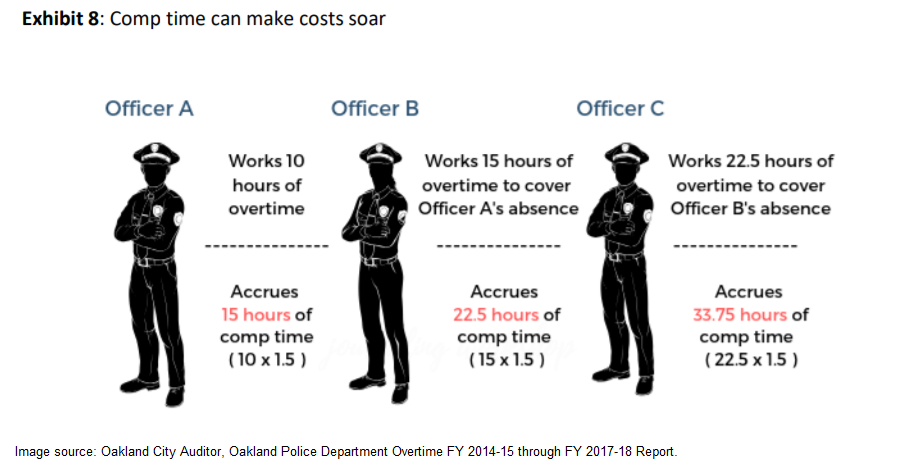Oakland’s soaring OT mostly due to deficient management, new audit confirms

The Oakland City Auditor just released a report analyzing the use of overtime pay in the city’s police department.
The findings are truly shocking, and repeatedly illustrate a total failure of management to perform any type of meaningful oversight. Under a section titled, “overtime operational controls are lacking,” the audit recounts a previous inspection which found that “overtime forms could not be located for 83 percent of paid overtime instances.” (p. 20)
The audit also found that “the Department cannot efficiently reconcile between the scheduling and the payroll systems,” which is essential to ensuring the “accuracy of paid overtime.” (p. 21)
In other words, the department lacks any meaningful way to verify the accuracy of overtime, and the process that is in place for documenting overtime is often ignored.
Perhaps the clearest example of how unserious the department is about controlling overtime costs comes from a success story. The audit reports that a police captain was able to ensure overtime pay in his patrol was kept under budget by simply creating “an excel spreadsheet with the ability to track and calculate daily overtime expenditures.” (p. 19)
Unfortunately, this basic oversight tool “was never adopted by other organizational units and is no longer being utilized by the Captain due to time constraints.” (p. 20)
The $2.45 million cop explained
According to the audit, only about a third of the overtime hours paid out in the most recent fiscal year went towards what is traditionally thought of as overtime work, like filling in for another officer, working beyond the regularly scheduled shift, and so forth.
At 42 percent of total overtime hours, special events — which include sporting events, parades, protests and concerts — was the largest category of overtime in both the most recent fiscal year and the several that preceded it.
This explains how police officer Malcolm Miller has been able to accrue $2.45 million in pay and benefits over the past five years.
Apparently, Mr. Miller is the “one officer…responsible for most decision-making” regarding who gets assigned to work these special events at overtime rates. While not mentioning him by name, the audit noted that “he consistently assigned himself to work many of the special events,” which led to the conclusion that, “more management oversight is needed immediately to ensure that the process is fair and appropriately staffed.”
Existing policies ignored
The audit also observed that the few policies that are in place which aim to reduce excessive overtime pay are often completely ignored. For example, current policy prohibits employees from working voluntary overtime if they are on paid leave. However, “the audit uncovered over 3,600 instances in which all personnel worked overtime when they were on paid leave.” (p. 26)
In a similar vein, the just-released audit observed that the city ignored all of the recommendations from a 2015 audit regarding wasteful provisions in the city’s contract with the police union.
One of the 2015 recommendations that the city ignored addressed the inherently wasteful practice of awarding comp time, rather than money, for overtime hours worked.
As the audit explained, “when an officer takes comp time, another officer must work overtime to fill the vacancy. If the replacement officer elects to take overtime as comp time, the cost can quickly grow as Exhibit 8 demonstrates.”

The above is just a sampling of some of the audit’s findings. To read the full report, please click here.
And to review the just-published 2018 pay data, please visit TransparentCalifornia.com.

